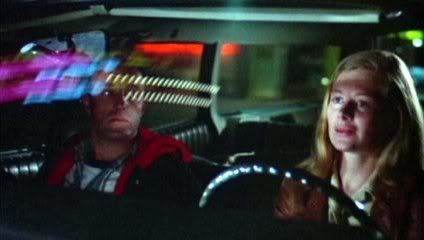What are you doing so far from home without your husband?

Following his ill-fated stab at making a big-budget Hollywood musical (1968's Finian's Rainbow), Francis Ford Coppola formed his own production company (American Zoetrope) and set out on the back roads of middle America to make an independent feature that was, in diametric opposition to Finian's huge cast, essentially a three-hander. The result was 1969's The Rain People, which attracted a cult audience and set him on the path that would lead to a string of successes throughout the '70s. It's a film I've wanted to see ever since I got Danny Peary's first Cult Movies book, but I didn't want to settle for the pan-and-scan video that would have been my only recourse until TCM aired it letterboxed earlier this month. (And for anybody who wants to add it to their collection, Warner Bros. has also released it as part of its Archive Collection. Personally, I don't feel the urge, but I'm glad the option is out there.)
As the film opens, restless housewife Shirley Knight quietly slips out of bed and out of her husband's grasp (both literally and figuratively), showers, leaves him a note and sets out from their Long Island home in their Ford station wagon to escape their stifling marriage. When she calls him from the Pennsylvania Turnpike, her husband is beside himself and all she can tell him is that she "just had to get away for a while." Oh, yes. And she's also pregnant, but she's not sure if she wants to keep the baby. She doesn't even know where she's going exactly, but west seems to be the general drift and it isn't long before she picks up hitchhiker James Caan, who blithely tells her his nickname is "Killer." The first sign this film was made in 1969: a woman picks up a hitchhiker named "Killer" and doesn't bat an eye.
The longer they travel together, the more Knight finds out about Caan, who turns out to be a former college footballer who received a debilitating brain injury during a game and has since been cut loose by the school with nothing but a thousand dollars to his name and the unfortunate tendency to flash it around. This troubles Knight, who doesn't want to be responsible for him but can't help but feel protective of him all the same. Eventually she leaves him at a roadside reptile ranch, but almost immediately gets pulled over for speeding by Nebraska highway patrolman Robert Duvall and has no choice but to return to pay her fine. Having failed to find a suitable lover in Caan (she lost interest when she found out he wasn't all there upstairs), Knight finally ditches him for good and tries to initiate an affair with Duvall but is put off by the presence of his headstrong pre-teen daughter in his cramped trailer. It's enough to make even the most independent-minded woman rethink her life choices.
It's hard to pinpoint how much of The Rain People was scripted and how much of it was improvised on the spot. In a lot of ways it feels like Coppola and his actors made it up as they went along, starting in New York and heading west until they found a place for the story to end. Throughout the film, though, there are signs that Coppola knew what he was doing the whole time, like the brief flashbacks to Knight's wedding and early days of marriage, Caan's big game and Duvall's great tragedy. (Suffice it to say, there's a reason why he can't control his daughter.) A spirited rebuke of Hollywood's production-line mentality, it's the unpredictability of the story and the richness of the characters that draws you in and keeps you watching right up until the last frame.